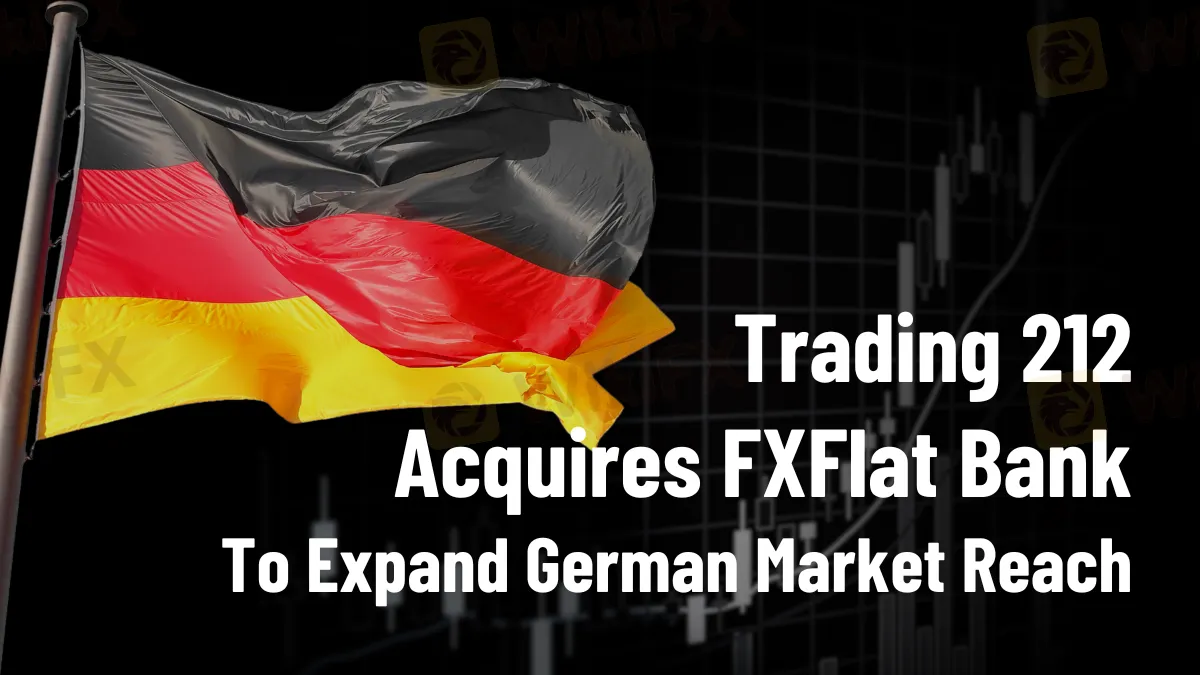简体中文
繁體中文
English
Pусский
日本語
ภาษาไทย
Tiếng Việt
Bahasa Indonesia
Español
हिन्दी
Filippiiniläinen
Français
Deutsch
Português
Türkçe
한국어
العربية
Trading 212 Acquires FXFlat Bank to Expand German Market Reach
Abstract:Trading 212 acquires Germany's FXFlat Bank to expand its presence in the German market, offering zero-commission trading and enhanced services to investors.

Trading 212, a London-based online brokerage, has made a big step towards European development by purchasing Germany's FXFlat Bank GmbH. This purchase is consistent with Trading 212's objective to expand its footprint in Germany and provide its zero-commission trading model to German customers. The financial terms of the transaction have yet to be revealed.
FXFlat Bank, a well-established German financial services firm licensed by BaFin, has been in business since 1997. The firm provides diverse trading choices, including forex, contracts for difference (CFDs), futures, stocks, options, bonds, ETFs, and mutual funds over 135 worldwide exchanges. FXFlat's reputation as a multi-asset broker makes it an appealing acquisition target for Trading 212, quickly growing throughout Europe.
In a statement posted on FXFlat's website, the German broker expressed enthusiasm about joining the Trading 212 family, citing the UK-based firm's reputation as one of Europe's fastest-growing fintech businesses. FXFlat's staff is currently cooperating with Trading 212 to expand the platform's services throughout Germany. During this changeover, FXFlat will temporarily stop onboarding new customers while current clients will continue to get complete assistance.
Trading 212 is now represented in Germany by Trading 212 Markets Limited. This purchase gives the corporation a fully licensed German organization, which strengthens its presence in the nation. Trading 212 stressed in its official statement that this change would improve the company's value proposition for German clients by providing a better user experience and access to a broader range of financial products regulated in Germany.

Trading 212 has been a fintech pioneer from its beginning, being the first UK retail broker to provide commission-free trading. Its primary services include equities, exchange-traded funds (ETFs), foreign exchange (FX), and derivatives. The purchase of FXFlat Bank is consistent with Trading 212's long-term aim of expanding its product line and geographical reach.
Trading 212 took another step forward earlier this year when it established Trading 212 Crypto Ltd, a subsidiary focusing on digital asset services. A Class 3 registration allows the platform to provide a variety of services, including spot trading, custodial services, staking, and card services. The entry into cryptocurrency demonstrates Trading 212's dedication to keeping ahead of industry trends and broadening its products.
Furthermore, Trading 212's activities under the CySEC regulatory framework allow the business to expand its services into European markets. This enlarged regulatory profile is part of Trading 212's overall goal of being a market leader in both Europe's digital and conventional financial sectors.
Explore Trading 212's expansion into Germany with the acquisition of FXFlat Bank GmbH. Learn more on WikiFX. Visit the Trading 212 page for details.

Disclaimer:
The views in this article only represent the author's personal views, and do not constitute investment advice on this platform. This platform does not guarantee the accuracy, completeness and timeliness of the information in the article, and will not be liable for any loss caused by the use of or reliance on the information in the article.
Read more

Risky Choice? What Traders Should Know About Bold Prime
Risk exists everywhere — even well-known brokers are not exceptions. But they often don’t talk about the risks. Instead, they highlight their strengths and try to attract customers while hiding the potential downsides. However, in this article, you’ll learn about the risks involved with Bold Prime.

From Novice to Pro: Why Investors Trust Land Prime?
If you're passionate about forex trading and ready to begin your journey as a trader, this article is worth exploring. It highlights the key features that Land Prime offers to both traders and investors.

Axi launched a new liquidity service named AxiPrime
This week, Sydney-based broker Axi unveiled AxiPrime, a dedicated institutional liquidity offering, and announced a technology partnership with YouBourse to accelerate its rollout. In this article, we’ll share our hands-on review, explain the service’s core benefits and limitations, and provide context on how it fits into the evolving landscape of institutional trading platforms.

Five Positive Signs That Make BCR Reliable Broker
Thinking of investing? Exploring Brokers and Have you come across BCR Forex Broker but feel confused? Is it a great choice or a bad decision? Hold on . Check out the article and know why this broker could be a trustworthy choice for you.
WikiFX Broker
Latest News
Top Wall Street analysts are upbeat about these dividend-paying stocks
Singapore's economy grows 4.3% in second quarter, beating expectations
In middle of Trump's trade war, importers hold more cash and move inventory off the books
Asia-Pacific markets trade mixed as investors assess Trump's latest tariff threats; bitcoin hits new highs
Gold Soars Above $3,350 as XAU/USD Rallies on Trade Tensions
What WikiFX Found When It Looked Into Emar Markets
Short or Long Term: Which to Choose for Double-Digit Returns from Gold Investments?
What is Forex Trading Simulator?
MT4 vs MT5 Which Forex Trading Platform Fits Your Needs in 2025?
Stock futures slide on more Trump tariff letters, but are off worst levels of session: Live updates
Currency Calculator


